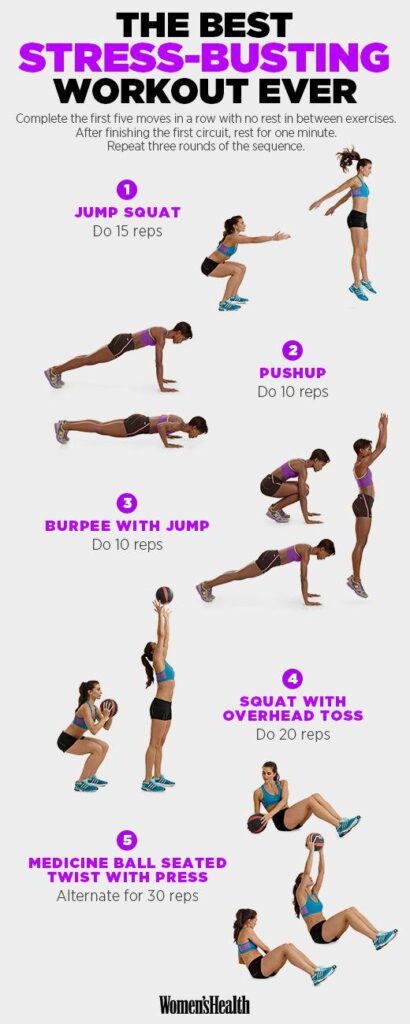In today’s fast-paced world, stress has become an almost inevitable part of our daily lives. While many seek quick fixes or temporary relief, one of the most effective and natural ways to combat stress lies in cardio exercise. From boosting endorphin levels to improving sleep quality, cardiovascular workouts offer a powerful tool to not only manage but substantially reduce stress. In this article, we’ll explore how cardio exercise impacts the body and mind, revealing why incorporating it into your routine can be a game-changer for achieving lasting mental well-being.
Table of Contents
- The Science Behind Cardio and Stress Reduction
- How cardio Exercise Boosts Mood and Lowers Anxiety
- Optimal Cardio Workouts for Managing Stress
- Incorporating Cardio into Your Daily Routine for Lasting Calm
- Final Thoughts
The Science Behind Cardio and Stress Reduction
When we engage in cardiovascular exercise,our bodies initiate a complex cascade of biochemical responses that directly impact our mood and stress levels. One of the most meaningful changes is the release of endorphins, frequently enough dubbed as “feel-good” hormones, which act as natural painkillers and mood elevators. additionally, cardio stimulates the production of neurotransmitters like serotonin and dopamine, which play essential roles in regulating anxiety and promoting feelings of relaxation. This neurochemical cocktail not only helps to alleviate immediate feelings of stress but also enhances overall emotional resilience over time.
Physical activity that elevates the heart rate also reduces levels of the stress hormone cortisol,which,in excess,can contribute to anxiety,depression,and cardiovascular problems. Beyond the biochemical effects, cardio exercise promotes better sleep—a critical component for managing stress effectively. Other benefits include:
- Improved cognitive function which helps in better decision-making under pressure
- Enhanced circulation leading to quicker recovery from day-to-day stressors
- Increased mindfulness as many cardio routines promote a rhythmic, meditative state
How Cardio Exercise Boosts Mood and Lowers Anxiety
engaging in cardio workouts triggers the release of key neurotransmitters such as serotonin, dopamine, and endorphins—often referred to as the brain’s “feel-good” chemicals.These naturally occurring substances play a crucial role in enhancing mood and creating a sense of well-being. Regular aerobic exercise also helps regulate the body’s stress response by lowering cortisol levels, which are often elevated during periods of anxiety. This biochemical balance not only brightens your mental state but also contributes to improved cognitive function and emotional resilience.
Additional benefits of cardio exercise for mental health include:
- Improved sleep quality, which is essential for reducing anxiety symptoms
- Increased production of brain-derived neurotrophic factor (BDNF), supporting neural growth and mood regulation
- Distraction from daily stressors, providing a mental “reset”
- Boosted self-confidence through enhanced physical fitness and stamina
Optimal Cardio Workouts for Managing Stress
Engaging in cardio exercises like running, cycling, or swimming triggers the release of endorphins—natural mood elevators that flood the brain and create a sense of well-being. For managing stress effectively, moderate-intensity workouts lasting 30 to 45 minutes are ideal, as they provide sustained stimulation without overwhelming the body. Additionally, incorporating activities such as brisk walking or dancing into your routine can elevate heart rate to optimal levels, promoting relaxation and reducing cortisol, the stress hormone.
To maximize stress relief, consider integrating these cardio workouts into your weekly schedule:
- Interval training: Alternate bursts of high intensity with recovery periods to boost cardiovascular health and mental clarity.
- Steady-state cardio: Maintain a consistent pace,which helps calm the mind and improve endurance.
- Group cardio classes: Like spin or aerobics, these foster social interaction, which further diminishes stress.
Incorporating Cardio into Your Daily routine for Lasting Calm
Integrating cardio workouts into your everyday life doesn’t require hours at the gym or intense marathon training sessions. Even short, consistent bursts of activity—like a brisk 20-minute walk, cycling to work, or a quick jog around the neighborhood—can significantly elevate your heart rate and release endorphins, the body’s natural stress fighters. By making cardio a regular part of your schedule, you develop a natural barrier against everyday tension and anxiety, fostering a sense of inner calm that lasts beyond your workout session.
To seamlessly incorporate cardio into your routine,consider these practical strategies:
- Morning Movement: Kickstart your day with light cardio to set a positive tone and boost mental clarity.
- Active Breaks: Replace sedentary breaks with a quick walk or stair climb to refresh your mind and body.
- Social Cardio: Combine exercise with socializing by joining a running club or group classes, enhancing motivation and emotional support.
Embracing these habits can transform cardio into a powerful tool for sustained tranquility and improved overall well-being.
final Thoughts
Incorporating cardio exercise into your routine offers a powerful,natural way to combat stress and boost overall well-being. Beyond the physical benefits, engaging in consistent cardiovascular activity helps regulate mood, improve sleep, and enhance mental clarity—key factors in managing daily pressures. Whether it’s a brisk walk, a cycling session, or a high-intensity workout, finding a form of cardio that you enjoy can make stress reduction a lasting and rewarding part of your lifestyle. Remember, prioritizing your mental health through exercise is not just a choice but an investment in a healthier, more balanced you.

